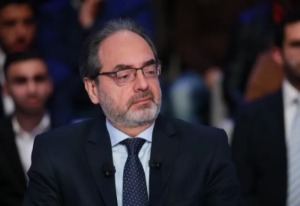Omar al-Rassi, “Akhbar al-Yawm” agency
Ghobril to"Akhbar al-Yawm": there is no need for haircut or restructuring the public debt
"Public finance in particular is one of the biggest beneficiaries of the crisis", said Nassib Gobril, head of economic research and analysis at Byblos Bank, explaining the decline in the value of public debt.

He said in an interview with the "Akhbar al-Yawm" agency, before the crisis began in 2019, the value of this debt was 100 billion dollars, 60% of it in Lebanese pounds (i.e. 60 billion dollars), but today the value of the debt in local currency at the current exchange rate (LBP 89,500 per one dollar) became 670 million dollars.
As for the Eurobonds worth 31 billion dollars, in addition to the amount of 8 billion overdue interest after the decision of the government of President Hassan Diab in March 2020 to default on their payment, their value also decreased, it is true that their nominal value is 39 billion, but their actual market value is 2.73 billion dollars, where the value of each bond has become 6 or 7% of its principal value.
On the other hand, the Lebanese state's loans from multilateral institutions such as the World Bank and development funds amount to two billion dollars, and the state is still paying interest and capital on time, so this figure is stable.
Ghobril added that based on these figures, the actual value of the public debt is 5.4 billion dollars, or 25% of the GDP estimated at 22 billion dollars last year, and it is likely to expand this year.
In this context, Gabriel explained that there have not yet been any negotiations on Eurobonds, and if its campaign manages to recover 20% of its value (an optimistic figure), the size of the public debt will become 10.5 billion, or 48% of GDP, knowing that when the negotiation date comes, the size of the economy is supposed to have expanded.
He continued: We see in the budget figures - which are not published by the state - that there are estimates by the World Bank that the general budget has achieved a surplus due to an increase in its revenues in 2023, especially after adjusting taxes and fees to be paid in dollars according to the exchange rate in the market, and thus increased Treasury revenues without increasing the value of expenditures, which led to a primary surplus in the budget and a general surplus in public finances.
Here, Ghobril pointed to the public sector deposits with the Bank of Lebanon (BDL), which amounted to 436 thousand billion liras, equivalent to 4.8 billion dollars in mid-June, meaning that the increase reached 300% compared to last year due to the adjustment of fees and taxes and their payment according to the market exchange rate, and therefore this confirms that the public finances and the state are the beneficiaries of the crisis.
Can this be translated by restoring some of the confidence that has been lost due to the crisis? Ghobril saw that at the beginning of the crisis, the focus was on restructuring the public debt, especially for Eurobonds, in parallel with writing off deposits or at least haircut in large proportions, but now haircut on Eurobonds happened automatically after its value fell by 93%, so it became equal to about 7% of its principal value.
Ghobril criticized the complete neglect of the provisions of the monetary and credit law to the point that in the event that the Bank of Lebanon records losses, the Ministry of Finance is responsible for covering them.
In response to a question, Ghobril said: the state should start changing its policy with the IMF, which is based on writing off deposits or haircut, and giving up talking about losses and the financial gap, explaining that the banking sector is unable to secure 90 billion dollars (that is, the value of deposits in foreign currencies), neither the state nor the Bank of Lebanon is able to secure them, so these three parties are required to secure 10 to 12% liquidity in foreign currencies, which is the international standard for ready liquidity for any bank in the world, and then the economic cycle runs automatically, and banks return to lending to the private sector, as the depositor can dispose of his deposit without the need to withdraw it in full.